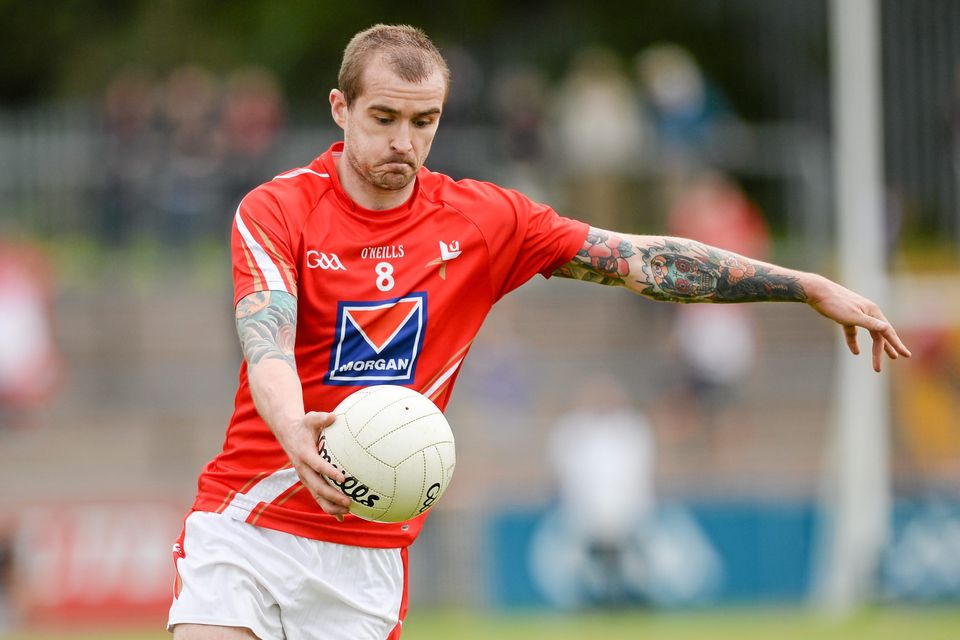Dublin’s two decades of financial help have put rest of Leinster ‘at huge disadvantage’ – former Louth captain Paddy Keenan
Paddy Keenan in action for Louth back in 2014
The financial backing that Dublin GAA has received from central funds over the past two decades has placed the rest of Leinster at a “huge disadvantage”, according to former Louth skipper Paddy Keenan.
It is 14 years since Keenan almost led his county to a first Leinster SFC title since 1957, only to be denied by Joe Sheridan’s wrongly-awarded goal for Meath in the dying seconds of the 2010 decider.
Since then, Dublin have won a record 13 straight provincial titles and are 1/100 favourites to defend their crown when facing Louth in Croke Park this Sunday.
Keenan has suggested that talk of a Louth ambush is only a “pipedream”, but he is craving clear signs of progress from last year’s Leinster final, when they lost by 21 points.
Today's Sport News in 90 Seconds - 10th May
However, he believes the days of the provincial championships are numbered, especially pertaining to their role in the wider All-Ireland race.
“I think the horse has probably well and truly bolted on Leinster,” Keenan told the Irish Independent ahead of Sunday’s Croke Park showpiece.
“Whether by design or not, Dublin have just got too far ahead of the chasing pack in Leinster and I think it’s very, very hard to claw that back.
“They have the culture, they have the structure, they have underage, and you have to give Dublin massive credit for putting all those things in place.
GAA Preview Week 6
“But you can’t deny that the financial help they’ve got for 20 years has put everybody in Leinster at a huge, huge disadvantage,” he maintained.
“I’m not saying Dublin didn’t need that funding – obviously it was put to very good use and all the rest.
“But when you’re up in Louth here, the smallest county in the country, two soccer towns, we don’t even have a stadium to play in – but we’ve got very, very little help from the GAA,” the former All-Star midfielder claimed.
“Whether that’s to help whenever the Leinster final thing went awry (in 2010) or whether that’s funding or whether it’s help with the stadium, we’re crying out for as much support and help as we can get to raise the standards within the county.
“We’re really badly struggling for help, and we have been for not just ten years – for 50-60 years.
“You can lay a bit of the blame on Louth, you can lay a bit of the blame on the GAA – but you do have to give credit to Dublin. They have put all that finance to good use, but you can’t deny that would help.
“We can only deal with what we control,” he added, “but when you’ve a tiny pick, you don’t have a history, financially you’re well behind, how do you bridge that gap?”
To have lifted the Delaney Cup in 2010 would have crowned Keenan’s career, but he has now concluded that “the provincials, by and large, are gone. Ulster obviously is still very competitive, Connacht the same. But you’re wasting your time in Leinster and Munster.
“And if you even look at Monaghan, they’ve lost the first round in Ulster and they’re still in the exact same position they would have been in anyway. They’re still making the group stages, so what’s the value – particularly in Ulster – of slogging through maybe three or four games to finish up in the same spot?
“I think its days are numbered, that’s my personal opinion, but obviously you’re looking at two provinces being fairly competitive, two being completely uncompetitive, and how do you square that circle?”
Looking ahead to Sunday, with Louth contesting back-to-back Leinster finals for the first time since 1958, Keenan is hopeful that a team now managed by Ger Brennan will “learn a lot” from last year’s final. That had been “a disaster the way it finished up.”
“Your journey is up in hope rather than expectation,” the St Patrick’s clubman admitted.
“We would have got great experience out of playing Kerry, Cork, Mayo, Dublin last year. I don’t know when a Louth team would have played all those top teams. We took a couple of beatings, but that should give us quite a bit of learning.
“It probably sounds a bit condescending,” he continued, “but if we can keep it tight, gather together a couple of nice scores and play to a pattern where you can build on that into the group stages and maybe into the following season … the last thing you want is a similar scoreline or result from last year. That’s no good for anybody, Dublin included.
“An improvement on last year and showing signs that we’re going to be more competitive against the top teams is progress. And if that means five or ten points in the difference, it’s still progress even though it’s a fairly decent beating.”















